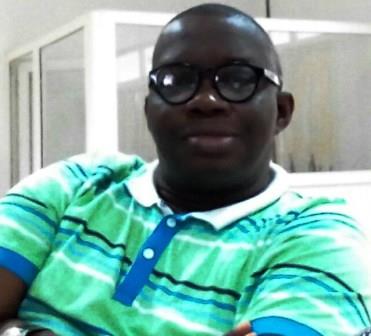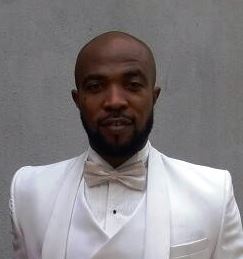CLICK HERE TO RETURN TO NIGERIAN FACULTY HOME
Faculty Profile: Doctor Glory OluwagbengaOgunfowokan - Regional Faculty Lead MBBS, AFMCGP, FWACP

WHO/TDR R&D Fellow
About: A Family Physician with special interest in Clinical Research in Tropical Diseases especially Malaria. A Fellow of WHO/TDR in Clinical Research and Development.A physician with National Hospital Abuja Nigeria. As a WHO/TDR Tropical Disease Clinical Research and Development Fellow I was involved in three main projects at various stages of development. The projects are:- 1) E1224 – A novel drug in phase 2 clinical development for the treatment of chronic indeterminate chagas disease. 2) E6446 – A novel drug to be used as an adjunct therapy for the treatment of cerebral malaria. 3) E1210 – A novel drug for the management of systemic fungal infection. I was involved in and learnt about:- i) Various stages of drug development from drug discovery processes, pre-clinical studies and the four phases of clinical trial. ii) Project planning and implementation involving various team members such as project team leader, leads in various aspects such as clinical study, clinical pharmacology, chemistry, manufacturing and control, preclinical and clinical safety, biostatistics, data management, drug metabolism and pharmacokinetics, regulatory affairs, and the project manager among others. Implementation is time bound and human and financial resources among other resources are deployed to execute the project. iii) Collaboration between industry, academic institution, contract research organizations, consultants and funding organizations including the processes and legal and financial agreements involved. iv) Study designs involved in pre-clinical, phase 1 and phase 2 clinical trials including pros and cons of traditional phase 11 trial and phase 2b/3 trials using complex adaptive designs. v) Regulatory functions of Food and Drug Administration (FDA) in drug development including pre-investigational new drug, investigational new drug and new drug applications. vi) Importance and contents of investigator’s brochure (IB) and the processes of developing, editing and up-dating IB. vii) How to develop a protocol concept sheet and a study protocol based on standard operating procedures and in accordance with ICH guidelines. viii) ICH-GCP guidelines using various study modules and the application of the guidelines in practice. ix) The essence and contents of an annual report to FDA. x) How to determine first in human dose using No Observed Adverse Effect Level (NOAEL) in the most sensitive animal specie and Minimum Achievable Biological Effect Level (MABEL) xi) Literature search and preparation of a briefing book for a pre-IND meeting with FDA. xii) Introduction to the principles and practice of clinical research – an online course provided by National Institute of Health. Apart from these, I personally a) participated in a session of teleconference type C meeting with FDA. b) did a quality control review of a briefing book. c) Participated in various face-to-face, video-conference and teleconference meetings on the three projects. d) developed a protocol concept sheet for one of our projects. e) Wrote a study protocol for one of our projects.
Location: National Hospital Abuja Nigeria
Faculty Profile: Augustine Anayochukwu ONYEAGHALA PhD, MSc, FMLSCN, PGDQA, PGDCR, MSQA

Dr Augustine Onyeaghala is a Medical Laboratory Scientist, Clinical Research Scientist, Lecturer, Researcher, Toxicologist, Quality Management Systems (QMS) Consultant and Author. He obtained his Associate degree in Medical Laboratory Science, with specialization in Chemical Pathology, Fellowship of the Medical Laboratory Science Council of Nigeria (MLSCN) in Chemical Pathology, MSc in Chemical Pathology and PhD in Clinical Research. His doctoral research focused on identification and characterization of novel pharmacological profiles of a named herbal medicine (Yoyo Bitters) and their role in the management of cervical cancer using human cervical cancer cell lines (HeLa). This study was the first detailed research conducted on the named herbal product. Many scientific papers generated from it have been published for local and global consumption; and presented at many international and local conferences. Thousands of the papers have been downloaded by research scientists across the globe.
Dr Onyeaghala has a combined experience of more than 20 years in clinical laboratory science, lecturing, laboratory management and mentoring. He has worked in different capacities at various institutions including the University College Hospital, Ibadan (Deputy Director, Training,) and AfeBabalola University, Ado Ekiti (Senior Lecturer) where he teaches general chemical pathology, toxicology, laboratory management , research designs, methodology and implementation amongst others .
He has been involved with Global Health Trial Network (GHTN) activities since 2012 when he became one of the faculty members who facilitated the first ever GHTN training workshop on clinical trial in Nigeria which was held in Abuja. Since then, he has been committed to GHTN Global and Nigeria Faculty activities, facilitating several workshops and delivering diverse papers on topics centred on clinical research. He has featured on GHTN program titled: Meet the Experts where he answered questions raised by clinical research professionals from across the globe. He has written seasoned publications for GHTN some of which are: understanding quality management systems in clinical research and basic statistics for clinical research professionals. As a quality assurance professional, he has delivered several papers on quality assurance in clinical research both at local and international meetings. He has also assisted several organizations to set up quality systems which are required for effective delivery of desired objectives.
Dr Onyeaghala has won several international and local awards including University of California Los Angeles (UCLA/Johnson& Johnson Management Development Institute (MDI) scholarship, Pfizer Clinical Research Conference Travel, International Biopharmaceutical Association Scholarship for training in clinical research amongst others. He has also managed some research grants and published good number of research and industry papers in local and international peer-reviewed journals of high repute. He has attended many conferences and made many scientific presentations at both local and international conferences .He is a member of many local and international professional bodies including the society for quality assurance ( SQA) and Association of Clinical Research Professionals (ACRP) both in USA.
He can be reached on Email: aaonyeaghala@gmail.com.
Read Augustine's article: Statistics From the Beginning
Faculty Profile: Emmanuel Ifechukwude Benyeogor

Emmanuel Ifechukwude Benyeogor is an early career Epidemiologist. He loves to make sense of data and is currently a candidate of Data Scientist Course by John Hopkins Bloomberg School of Public Health on Coursera. He has three years of experience in the non-profit sector and recently completed his Masters of Science in Public Health (epidemiology option) at the University of Lagos in Nigeria where his thesis was on the “Knowledge, Attitude and Home management of diarrhoea in under-fivesby Caregivers in a rural community”. He is a faculty member and has been involved withand committed to the faculty sincejoining the West and Central Africa Faculty. He joined GHT in 2012 on invitation from Tamzin (Project Manager) during his National Service Youth Corps service in Sokoto. While echoing the ethos of global health research, he also facilitates health information dissemination equipping health personnel in hard to reach areas of LMIC as Country Representative and member Social Media Working Groupof Health Information For All (HIFA).He has helping to bridge the knowledge gap among health personnel and rural dwellers living in hard to reach areas.
Previously, Emmanuel worked with a community-based organization to advance health education and promote adolescent reproductive health awareness for a year in Sokoto, North-South of Nigeria. He has expertise in social media marketing and has worked as an SM team member at the United Bank for Africa and is a Microsoft Certified Solutions Associate (MCSA 2012). Through these experiences, he developed strong project coordination and implementation skills.
Emmanuel enjoys focusing on the topics of public health, global health, epidemiology, data management, humanitarian aid, outbreak and has a strong passion for sustainable youth empowerment and development.
Faculty Profile: Dr Morenike Oluwatoyin Ukpong-Folayan

Dr Morenike Oluwatoyin Ukpong-Folayanis a Reader with the Obafemi Awolowo University and pursues her advocacy work on the platform of the New HIV Vaccine and Microbicide Advocacy Society both located in Nigeria. She addresses herself as a community ethicist who advocates for the active engagement of people who can appropriately represent communities in the design, implementation and monitoring of research that impacts on their rights and welfare. She promotes and facilitates community engagement in research as an ethical imperative. She has been actively engaged in the development of international and national guidelines and documents and facilitates community engagement in biomedical HIV prevention research. She also works on key populations and adolescents’ issues with focus on highlighting sexual, reproductive, mental and oral health problems of adolescents in general, and those most vulnerable to health problems, face. Her work with colleagues in the field not only generated evidence on the need to address sexual and reproductive health, but it also led to the development of a national document that provided guidelines on tackling ethical issues associated with conducting research with adolescents in Nigeria. More recently, Dr Ukpong-Folayan advocates and has written multiple publications about 'why' and 'how' stakeholders can be engaged with Ebola research. She has experience designing, implementing and reporting both qualitative and quantitative studies for research; conducting monitoring and evaluation exercises for both general and key populations programmes; and advocating for use of research outcomes for policy formulation and programming in the field of HIV, bioethics and adolescents health in Nigeria. She has also worked on the development of guidelines developed by WHO on ethical conduct of research during infectious disease emergencies; and principles of stakeholders’ engagement in research conducted during infectious disease emergencies. She is currently looking at how to resolve ethical quagmire that may be associated with engaging communities in research conducted during infectious disease epidemics of the type and nature witnessed with the Ebola epidemic. She had worked as a Consultant with the National Agency for the Control of AIDS, Population Council, ITAD, UNAIDS, WHO, Global Fund, MEMSII (a USAID funded project), WHO among others. She has also worked in a number of Africa countries including Kenya, Bostwana and Malawi.